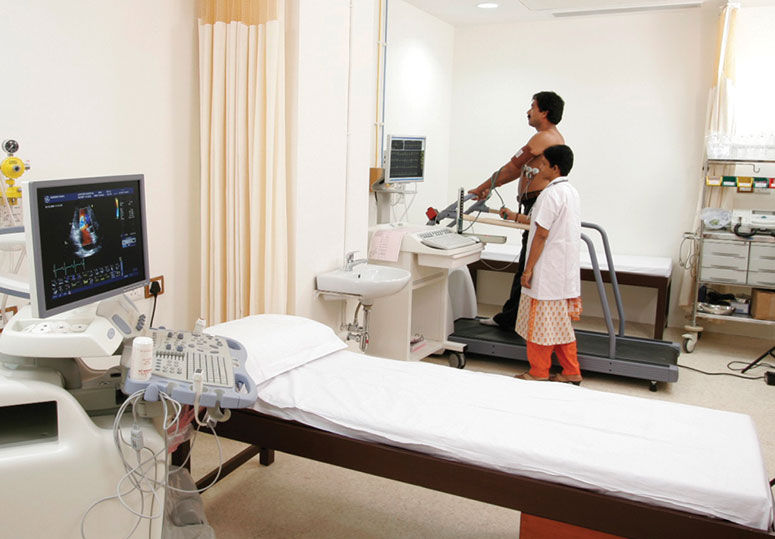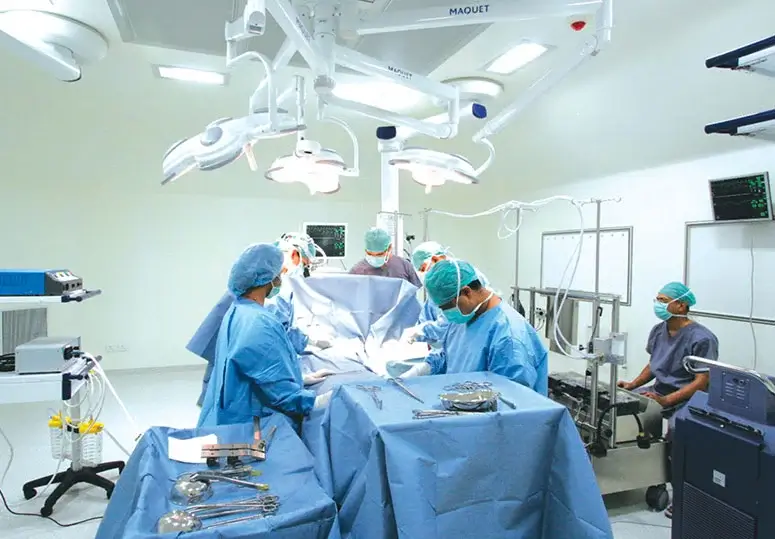Bariatric Surgery in Pune
Effective Weight Loss Through Specialized Bariatric Procedures
If you're in search of bariatric surgery treatment in Pune, your quest ends at our Bariatric Surgery Department. We are dedicated to ensuring the safety and success of your weight loss journey, offering exceptional care from diagnosis to post-operative support. With a team of renowned specialists and professionals working closely together, we stand as the foremost choice for those in need of a Bariatric Surgery Hospital in Pune.
Our Holistic Methodology
Within our Bariatric Surgery Department, we embrace a comprehensive approach to deliver the desired outcomes for our patients. Our team is composed of highly skilled surgeons, gastroenterologists, anaesthesiologists, technicians, counsellors, and dietitians, all of whom hold national and international recognition. Together, they craft a custom treatment plan that integrates the latest surgical techniques and a variety of bariatric surgery options.
Surgical Interventions
We take pride in offering our patients optimum medical care. Our array of bariatric surgery choices includes:
- Roux-en-Y Gastric Bypass
- Sleeve Gastrectomy
- Biliopancreatic Diversion
- Endoscopic Gastric Balloon
- Allurion swallowable pill balloon
- One anastomosis gastric bypass (OAGB) / Mini Gastric Bypass (MGB)
These procedures have a well-established track record of assisting patients in reaching their weight loss objectives and enhancing their overall well-being.
Patient-Centric Approach
Recognising the uniqueness of each patient, our commitment to your well-being extends beyond the surgical theatre. Our team provides comprehensive support and care before, during, and after surgery to guarantee a secure outcome. We are devoted to helping you attain your weight loss goals and enhance your overall health and quality of life.
When it comes to bariatric surgery treatment in Pune, our hospital ensures reliable medical care by offering researched solutions, a team of extensively trained specialists, and an assortment of surgical choices. Therefore, if you aspire to achieve weight loss success and enhance your overall health, we are your choice for a Weight Loss Surgery Hospital in Pune. Opt for our Bariatric Surgery Department for a thorough and patient-focused approach to your weight loss journey.
Team
Looking for the Bariatric Surgeon in Pune
Roux-en-Y Gastric Bypass (RYGB):
Among the most commonly performed bariatric surgery procedures, Roux-en-Y gastric bypass is renowned for its focus on reducing nutrient absorption through food intake restriction. This procedure, typically irreversible, involves the removal of a substantial portion of the stomach, leaving behind a small walnut-sized section. Moreover, a segment of the small intestine is also excised, with the remaining end connected to the remaining stomach section. This arrangement diverts the path of ingested food, bypassing a significant portion of the stomach and part of the small intestine. This diversion effectively suppresses the patient's appetite.
Sleeve Gastrectomy
Sleeve gastrectomy, another surgical option, entails the creation of a long, sleeve-like pouch by removing approximately 80% of the stomach. This results not only in a reduced stomach capacity but also a decrease in the production of the appetite-regulating hormone ghrelin. As a result, this procedure leads to a diminished appetite. It is worth noting that, unlike Roux-en-Y gastric bypass, it does not involve rerouting the intestines.
Biliopancreatic Diversion with Duodenal Switch
The biliopancreatic diversion with duodenal switch is a two-step procedure. The first step, reminiscent of sleeve gastrectomy, entails the creation of a sleeve-like pouch. Subsequently, this pouch is connected to the end section of the intestines near the duodenum. This connection bypasses a significant portion of the intestine, thus reducing nutrient absorption.
Endoscopic Gastric Balloon
This non-surgical option involves swallowing a deflated balloon capsule during a short endoscopic procedure. Once positioned in your stomach, the balloon is filled with saline solution, creating a feeling of fullness and reducing food intake. The balloon remains in place for several months before being removed endoscopically.
Allurion Swallowable Pill Balloon
Unlike the endoscopic balloon, the Allurion balloon is a revolutionary option that requires no surgery or endoscopy. You simply swallow a capsule containing a deflated balloon. Once in your stomach, the capsule dissolves, and the balloon is filled with saline through a thin catheter attached. The catheter is then removed, leaving the balloon in place for around four months. The Allurion balloon eventually deflates and passes naturally through your digestive system.
One Anastomosis Gastric Bypass (OAGB) / Mini Gastric Bypass (MGB)
This minimally invasive surgical procedure creates a smaller pouch in your stomach, restricting the amount of food you can consume. Additionally, a portion of your small intestine is bypassed, reducing nutrient absorption. The OAGB/MGB is a highly effective procedure for weight loss, but it requires a commitment to long-term dietary and lifestyle changes.
These bariatric surgical procedures offer a range of solutions for individuals seeking effective and lasting weight loss solutions, each tailored to specific needs and goals. Our dedicated team of medical professionals is committed to guiding you through these options to ensure a successful outcome for your weight loss journey.
Our Bariatric Surgery treatment in Pune offers dedicated care and facilities, complete with personalised treatment plans for each individual. When you choose us, you avail:
- Diagnostic and Therapeutic Facilities
- Specialised Intensive Care Units
- Well-Equipped Specialised Laboratories
- Current Surgical Techniques and Technology
- Personalised Treatment Strategies
Bariatric surgery is a powerful tool for weight loss, but it's not for everyone. Here at Jupiter Hospital, we believe in exploring all options before recommending surgery. You may be a candidate for bariatric surgery if you meet several of the following criteria:
- Body Mass Index (BMI): Generally, a BMI of 40 or higher is considered a strong indicator for bariatric surgery. In some cases, individuals with a BMI of 35 or more may qualify if they also have serious weight-related health problems.
- Weight Loss Struggles: Despite consistent efforts with diet and exercise, you haven't been able to achieve or maintain significant weight loss.
- Weight-Related Health Conditions: Obesity can worsen or contribute to various health issues. If you have conditions like type 2 diabetes, severe sleep apnoea, uncontrolled high blood pressure, or joint problems significantly impacted by your weight, bariatric surgery might be an option.
The decision for bariatric surgery is highly individual. Our team of bariatric specialists at Jupiter Hospital will consider your unique medical history, weight loss attempts, and overall health to determine if surgery is the right approach for you. Schedule a consultation with our specialists to discuss your weight loss goals and explore all potential solutions, including non-surgical options.
Bariatric surgery is a powerful tool for weight loss, but it's not for everyone. Here at Jupiter Hospital, we believe in exploring all options before recommending surgery. You may be a candidate for bariatric surgery if you meet several of the following criteria:
- Body Mass Index (BMI): Generally, a BMI of 40 or higher is considered a strong indicator for bariatric surgery. In some cases, individuals with a BMI of 35 or more may qualify if they also have serious weight-related health problems.
- Weight Loss Struggles: Despite consistent efforts with diet and exercise, you haven't been able to achieve or maintain significant weight loss.
- Weight-Related Health Conditions: Obesity can worsen or contribute to various health issues. If you have conditions like type 2 diabetes, severe sleep apnoea, uncontrolled high blood pressure, or joint problems significantly impacted by your weight, bariatric surgery might be an option.
The decision for bariatric surgery is highly individual. Our team of bariatric specialists at Jupiter Hospital will consider your unique medical history, weight loss attempts, and overall health to determine if surgery is the right approach for you. Schedule a consultation with our specialists to discuss your weight loss goals and explore all potential solutions, including non-surgical options.
















 View Map
View Map Book an Appointment
Book an Appointment Find a Doctor
Find a Doctor Health Check-up
Health Check-up












 Find a Doctor
Find a Doctor Health Checkup
Health Checkup Book an Appointment
Book an Appointment